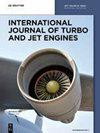基于直接性能参数闭环控制的串联TBCC发动机模式转换控制系统设计
IF 0.9
4区 工程技术
Q4 ENGINEERING, AEROSPACE
引用次数: 0
摘要
本文基于人工智能方法对TBCC发动机模式转换过程中发动机性能参数的闭环控制进行了研究。首先,提出了一种基于逐步回归分析和批量归一化深度神经网络的复合建模方法,建立了模态转换时的机载模型,实时估计了推力和进气道气流;其次,基于惩罚函数-粒子群混合优化算法,提出了适用于推力和进气道闭环控制的模式转换控制方案;最后,提出了一种基于相似度转换的数据处理方法,以扩大模态转换控制系统的适用包络范围。过渡时间缩短了33.3%,推力和入口气流波动分别减少了1.33%和10.77%。将控制系统应用于非设计模态转换过程,也获得了满意的模态转换性能。本文章由计算机程序翻译,如有差异,请以英文原文为准。
Design of mode transition control system for tandem TBCC engine based on direct performance parameters closed-loop control
Abstract This paper conducts a study on closed-loop control of engine performance parameters during mode transition process of TBCC engine based on artificial intelligence method. Firstly, a composite modeling method based on stepwise regression analysis and batch normalization-depth neural network is proposed to establish the on-board model during mode transition to estimate the thrust and inlet airflow in real-time. Secondly, based on the hybrid penalty function-particle swarm optimization algorithm, a mode transition control schedule applicable to the closed-loop control of thrust and inlet airflow is developed. Finally, a data processing method based on similarity conversion is proposed to extend the applicable envelope range of the mode transition control system. The transition time is shortened by 33.3 %, and the fluctuations of thrust and inlet airflow are reduced by 1.33 % and 10.77 %, respectively. When the control system is applied to the off-design mode transition process, a satisfactory mode transition performance is also obtained.
求助全文
通过发布文献求助,成功后即可免费获取论文全文。
去求助
来源期刊

International Journal of Turbo & Jet-Engines
工程技术-工程:宇航
CiteScore
1.90
自引率
11.10%
发文量
36
审稿时长
6 months
期刊介绍:
The Main aim and scope of this Journal is to help improve each separate components R&D and superimpose separated results to get integrated systems by striving to reach the overall advanced design and benefits by integrating: (a) Physics, Aero, and Stealth Thermodynamics in simulations by flying unmanned or manned prototypes supported by integrated Computer Simulations based on: (b) Component R&D of: (i) Turbo and Jet-Engines, (ii) Airframe, (iii) Helmet-Aiming-Systems and Ammunition based on: (c) Anticipated New Programs Missions based on (d) IMPROVED RELIABILITY, DURABILITY, ECONOMICS, TACTICS, STRATEGIES and EDUCATION in both the civil and military domains of Turbo and Jet Engines.
The International Journal of Turbo & Jet Engines is devoted to cutting edge research in theory and design of propagation of jet aircraft. It serves as an international publication organ for new ideas, insights and results from industry and academic research on thermodynamics, combustion, behavior of related materials at high temperatures, turbine and engine design, thrust vectoring and flight control as well as energy and environmental issues.
 求助内容:
求助内容: 应助结果提醒方式:
应助结果提醒方式:


